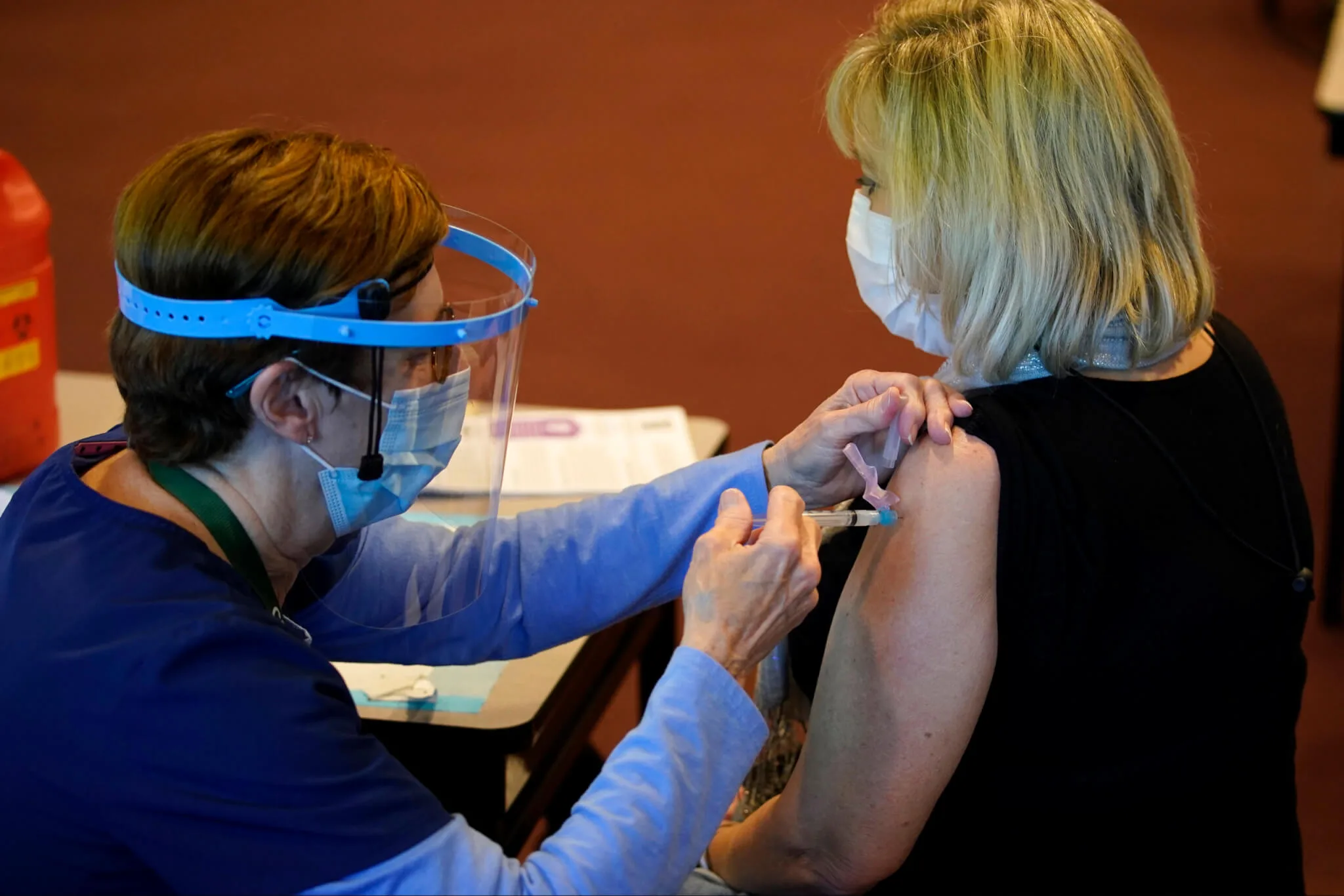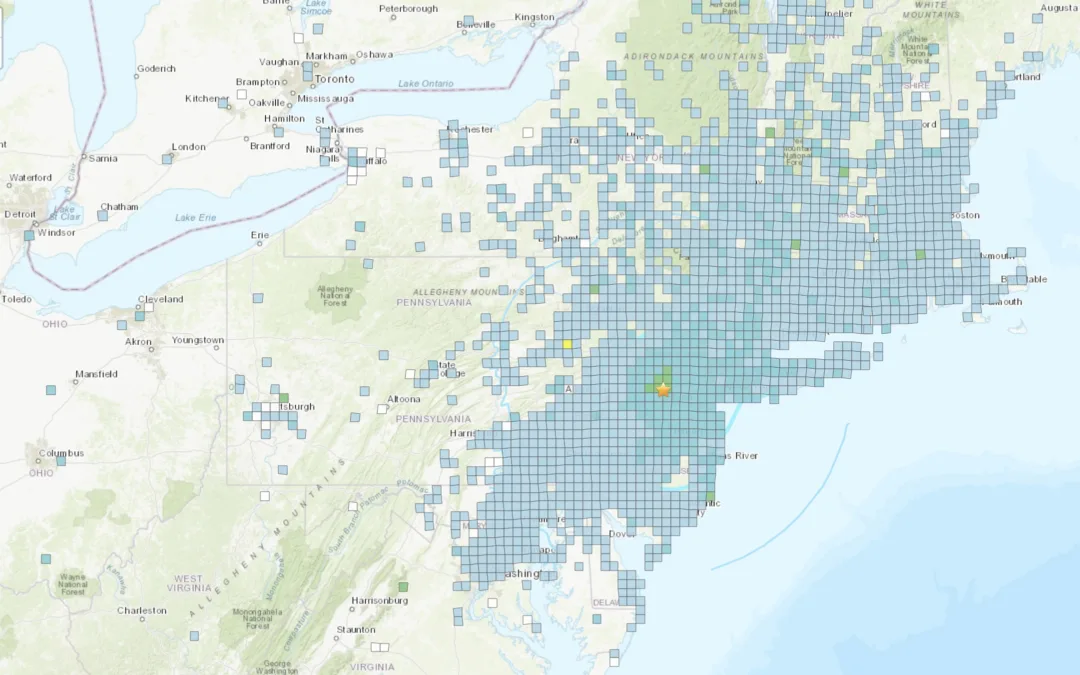
Pat Moore, left, with the Chester County, Pa., Health Department, administers the Moderna COVID-19 vaccine to Ann Yeager, a school district dental hygienist, at the Chester County Government Services Center, Dec. 29, 2020, in West Chester, Pa. (AP Photo/Matt Slocum)
Dr. Debra Powell, of Reading Hospital, explains why it’s important to get the COVID vaccine and answers some frequently asked questions about what to do after you get vaccinated.
Editor’s Note: This story was updated on March 9 to include new CDC guidelines.
If you are among the lucky folks who are fully vaccinated against COVID-19, you might be wondering what to do now.
Can you trash your mask? Lose the hand sanitizer? Hang out with friends and family? Return to a ‘normal’ life?
Or, maybe you’re still waiting to get the vaccine and are wondering what life after vaccination will look like.
Read on for the answers provided by Dr. Debra Powell, chief of Infectious Diseases Division at Reading Hospital—Tower Health.
What Does it Mean to Be Fully Vaccinated?
You are considered fully vaccinated two weeks after you have received a single dose of the Johnson & Johnson vaccine, or the second dose of either the Pfizer or Moderna vaccine.
Do I Still Need to Wear a Mask?
It depends on the situation.
The CDC issued new guidelines this week that say you don’t need to wear a mask if you are…
- Visiting with a small group of people who have also been fully vaccinated
- Visiting with a group of unvaccinated people from a single household who are at low risk of severe COVID-19 complications.
The CDC’s guidelines say you still need to wear a mask if you are…
- Living with unvaccinated people who are at a high risk of severe COVID-19 complications
- Visiting with unvaccinated people from a single household who are at a high risk of severe COVID-19 complications
- Visiting with unvaccinated people from multiple households
- In a public setting or on public transit.
The mask will continue to protect you and everyone around you as healthcare facilities work to vaccinate more of the population, Powell said.
“Be patient,” Powell said. “We are trying to get people vaccinated as fast as we can.”
Do I Still Need to Wash My Hands or Use Hand Sanitizer All the Time?
Yes. The CDC recommends that you continue washing your hands regularly even after you’re vaccinated. (That’s just good hygiene!)
Do I Still Need to Socially Distance?
It depends on the situation.
You don’t need to socially distance if you are…
- Visiting with a small group of people who have also been fully vaccinated
- Visiting with a group of unvaccinated people from a single household who are at low risk of severe COVID-19 complications.
You still need to socially distance if you are…
- Living with unvaccinated people who are at a high risk of severe COVID-19 complications
- Visiting with unvaccinated people from a single household who are at a high risk of severe COVID-19 complications
- Visiting with unvaccinated people from multiple households
- In a public setting or on public transit.
The risk of getting COVID is lower, but it’s not zero, Powell said. We must take all the precautions we can to keep everyone safe.
“The vaccine, socially distancing, wearing a mask, all this has gotten us to the point we are at now,” Powell said. “But we aren’t done yet. We still have a way to go.”
Can I Start Visiting Family and Friends?
You can safely visit family or friends indoors without masks and social distancing if the family member or friend you plan to visit…
- Is fully vaccinated and lives alone
- Is fully vaccinated and lives with people who are fully vaccinated
- Is fully vaccinated and lives with people who have not been vaccinated yet but are at low risk of severe complications from COVID-19
- Is partially vaccinated, is at low risk of severe complications from COVID-19, and lives alone
- Is partially vaccinated, is at low risk of severe complications from COVID-19, and lives with others who are at low risk of complications from COVID-19
- Is not vaccinated, is at low risk of severe complications from COVID-19, and lives alone
- Is not vaccinated, and lives with people who are at low risk of severe complications from COVID-19.
You can even hug!
However, you should limit your social interactions to waving through windows, talking on the phone, or chatting over Zoom if the family member or friend you plan to visit…
- Is fully vaccinated, but lives with people who are not vaccinated and are at high risk of severe complications from COVID-19
- Is partially vaccinated, but is at high risk of severe complications from COVID-19
- Is partially vaccinated, but lives with people who are not vaccinated or partially vaccinated and are at high risk of severe complications of COVID-19
- Is not vaccinated, but is at high risk of severe complications from COVID-19
- Is not vaccinated, and lives with others who are at high risk of severe complications from COVID-19.

“A quarter of our population are children, who can’t get the vaccine,” Powell said. “We need to keep each other safe. Get vaccinated when it’s available to you.”
Can I Eat Inside at a Restaurant or Attend a Concert or Sporting Event?
According to the CDC, restaurants are likely hotspots for coronavirus transmission because no one is wearing a mask while eating and ventilation is poor. While you may be vaccinated, you can still spread the virus.
If you do go to a restaurant, wear a mask and only sit with people who you are normally in contact with, Powell said.
You should continue to avoid medium- or large-sized gatherings and other events.
Can I Travel Out of State?
Powell cautions to avoid travel for non-essential reasons. If you do travel, continue practicing the health standards introduced during the pandemic.
Can I Still Get COVID?
It takes time for the vaccine to build up immunity in the body, Powell said. People can be exposed to coronavirus right before being vaccinated, or right after, and the body wouldn’t have had time to develop its defenses.
No vaccine is 100% effective, so there are still a small number of people who can get the virus even after being fully vaccinated, Powell said.
And the 95% efficacy of the Pfizer and Moderna COVID-19 vaccines have built-in wait times, according to the CDC. Moderna’s efficacy starts 14 days after the second dose, while Pfizer’s is seven days.
Can I Still Spread COVID?
If you have the disease—whether you are showing symptoms or not—you can definitely still spread it even if you are vaccinated, Powell said.
How Long Will Immunity Last?
“That is the key question,” Powell said. “We aren’t quite sure. We know it lasts at least six months, possibly longer.”
The novel coronavirus has only been around for a year. And the vaccines for even less time. Only time will tell.
How Long Will I Have to Do All This Stuff?
Life can start to return to “normal” when herd immunity is achieved, the CDC says. That means 70% to 80% of the population has immunity to the coronavirus.
Since roughly 24% of the US population are children under age 18, that means almost every American adult needs to get the vaccine.
When will that be? Hopefully soon. President Joe Biden says there will be enough vaccines for every American adult by the end of May.
Then, every adult will just need to get it.
Politics

It’s official: Your boss has to give you time off to recover from childbirth or get an abortion
Originally published by The 19th In what could be a groundbreaking shift in American workplaces, most employees across the country will now have...

Biden talks economic and tax plans in Scranton
President Joe Biden traveled to Pennsylvania on Tuesday and framed the 2024 election as a choice between Scranton values and Mar-a-Lago values....

Trump says he’s pro-worker. His record says otherwise.
During his time on the campaign trail, Donald Trump has sought to refashion his record and image as being a pro-worker candidate—one that wants to...
Local News

Railroad agrees to $600 million settlement for fiery Ohio derailment, residents fear it’s not enough
Norfolk Southern has agreed to pay $600 million in a class-action lawsuit settlement for a fiery train derailment in February 2023 in eastern Ohio,...

4.8 magnitude earthquake centered in New Jersey felt across Pennsylvania Friday morning
According to the U.S. Geological Survey, the quake’s impact in Pennsylvania was primarily felt in the eastern part of the state, though the...






